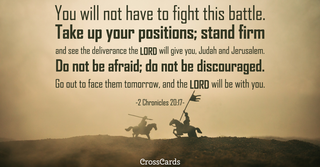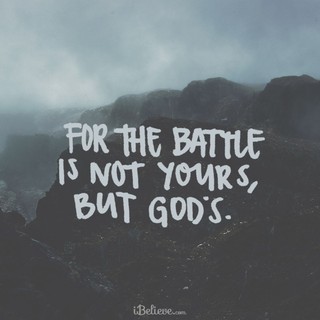- Recent Translations
- All Translations
2 Chronicles 20
Share
Settings
2 Chronicles 20 Commentary
Chapter 20
The danger and distress of Judah. (1-13) Jahaziel's prophecy of victory. (14-19) The thanksgiving of Judah. (20-30) Jehoshaphat's alliance with Ahaziah. (31-37)
Verses 1-13 In all dangers, public or personal, our first business should be to seek help from God. Hence the advantage of days for national fasting and prayer. From the first to the last of our seeking the Lord, we must approach him with humiliation for our sins, trusting only in his mercy and power. Jehoshaphat acknowledges the sovereign dominion of the Divine Providence. Lord, exert it on our behalf. Whom should we seek to, whom should we trust to for relief, but the God we have chosen and served. Those that use what they have for God, may comfortably hope he will secure it to them. Every true believer is a son of Abraham, a friend of God; with such the everlasting covenant is established, to such every promise belongs. We are assured of God's love, by his dwelling in human nature in the person of the Saviour. Jehoshaphat mentions the temple, as a token of God's favourable presence. He pleads the injustice of his enemies. We may well appeal to God against those that render us evil for good. Though he had a great army, he said, We have no might without thee; we rely upon thee.
Verses 14-19 The Spirit of prophecy came upon a Levite in the midst of the congregation. The Spirit, like the wind, blows where and on whom He listeth. He encouraged them to trust in God. Let the Christian soldier go out against his spiritual enemies, and the God of peace will make him more than a conqueror. Our trials will prove our gain. The advantage will be all our own, but the whole glory must be given to God.
Verses 20-30 Jehoshaphat exhorted his troops to firm faith in God. Faith inspires a man with true courage; nor will any thing help more to the establishing of the heart in shaking times, than a firm belief of the power, and mercy, and promise of God. In all our trust in the Lord, and our praises of him, let us especially look at his everlasting mercy to sinners through Jesus Christ. Never was an army so destroyed as that of the enemy. Thus God often makes wicked people destroy one another. And never was a victory celebrated with more solemn thanksgivings.
Verses 31-37 Jehoshaphat kept close to the worship of God, and did what he could to keep his people close to it. But after God had done such great things for him, given him not only victory, but wealth; after this, to go and join himself with a wicked king, was very ungrateful. What could he expect but that God would be angry with him? Yet it seems, he took the warning; for when Ahaziah afterward pressed him to join him, he would not, 1Ki. 22:49 . Thus the alliance was broken, and the Divine rebuke had its effect, at least for a season. Let us be thankful for any losses which may have prevented the loss of our immortal souls. Let us praise the Lord, who sought after us, and left us not to perish in our sins.
2 Chronicles 20 Commentaries
Chapter Summary
INTRODUCTION TO 2 CHRONICLES 20
Jehoshaphat having notice of a numerous army coming against him, 2Ch 20:1,2, betakes himself to fasting and prayer with his people, 2Ch 20:3-13, when they were immediately assured of victory by a prophet, which filled them with joy and thankfulness, 2Ch 20:14-21, and accordingly their enemies destroyed one another, and Jehoshaphat and his people returned to Jerusalem rejoicing and praising God, 2Ch 20:22-30, and the chapter is closed with an account of the latter part of Jehoshaphat's reign, 2Ch 20:31-37.

